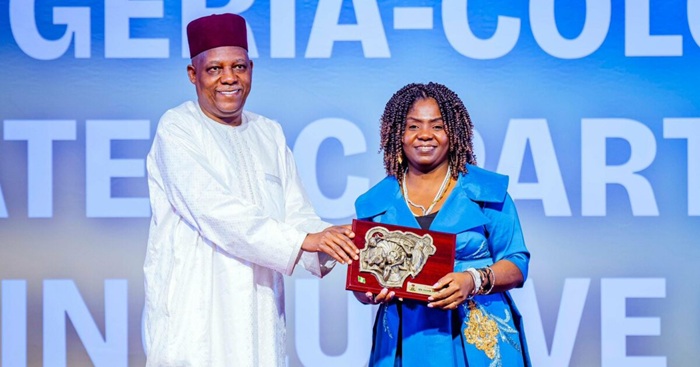Nigeria and Colombia have elevated their diplomatic ties with the signing of a Memorandum of Understanding (MoU) on political consultations, setting the stage for stronger economic and cultural collaboration. The agreement, formalized during the Nigeria-Colombia Bilateral Meeting and Business Forum at the Presidential Villa, was signed by Nigeria’s Foreign Affairs Minister, Yusuf Tuggar, and Colombia’s Deputy Minister for Multilateral Affairs, Mauricio Jaramillo Jassir.
According to Jassir, the MoU will pave the way for consistent political dialogue and ease visa approvals for Colombian diplomats, making bilateral engagement smoother and more effective.
Shettima Pushes for Economic Transformation
Nigeria’s Vice President, Kashim Shettima, emphasized that both countries must move beyond rhetoric and channel their abundant resources into measurable economic growth. Speaking at the Business Forum, he urged private sector players in both nations to explore partnerships in agriculture, industry, and culture while tackling shared challenges.
“To unlock real value, we must assess our similarities and differences, then transform these insights into stronger trade and investment, agricultural improvements, and cultural exchange,” Shettima said.
The Vice President noted Nigeria’s determination to expand beyond its oil dependency, highlighting agriculture, mining, and manufacturing as priority growth areas. He argued that tariff barriers in global trade underscore the need for diversification and called on Colombia to pursue a similar strategy.
Nigeria, he explained, is repositioning its agriculture sector for large-scale business by investing in advanced livestock technologies, agricultural machinery, fertilizers, pesticides, and strong supply chains. He added that the two countries share competitive advantages in cocoa, coffee, and tropical fruits, while also offering potential for collaboration in oil, coal, and renewable energy.
A Call for Shared Prosperity
Shettima outlined three steps both countries must take: remain adaptable to global trade policy changes, diversify exports to avoid overreliance on single commodities, and build investor-friendly environments. He also underscored culture as a vital link, stressing the role of Nigeria’s creative industry in youth empowerment and global competitiveness.
“It’s time to strengthen collaboration in cultural exchange, digital innovation, skill development, and intellectual property,” Shettima added, pointing to music, film, literature, and festivals as vehicles for deeper connections.
Colombia Sees Nigeria as a Strategic Gateway
Colombia’s Vice President, Francia Márquez, affirmed Nigeria’s position as a vital partner in Africa. She said her delegation came to renew bilateral ties and explore fresh opportunities in renewable energy, higher education, and trade.
“Nigeria represents a strategic market for Colombia,” Márquez stated, noting that Colombia already exports leather to Nigeria and intends to broaden cooperation in technology, energy, and education.
She also praised Nigeria’s hospitality and stressed her country’s commitment to working jointly on peace, security, and inclusive development.
Strengthening Historical and Economic Bonds
Foreign Minister Tuggar highlighted the historical links between both countries dating back to the transatlantic slave trade, describing the MoU as a chance to deepen economic ties in agriculture, hydrocarbons, and pharmaceuticals. Colombia’s Jassir echoed this, stressing that Nigeria offers Colombia its best entry point into Africa.
Nigeria’s investment landscape was also presented at the forum by Emmanuel Longza of the Nigerian Investment Promotion Commission (NIPC). He pointed to Nigeria’s 250 million-strong population, vast natural resources, and business incentives such as tax waivers. He emphasized opportunities in agriculture, technology, renewable energy, solid minerals, and the creative sector.
With 34 million hectares of arable land—less than half of which is currently cultivated—Nigeria’s agricultural capacity remains largely untapped. Industrial parks across the country, Longza added, are ready to support export-oriented industries and foreign investment.
Nigeria’s Economic Reform Agenda
Trade and Investment Minister Jumoke Oduwole used the event to highlight President Bola Tinubu’s economic reforms, including subsidy removal, exchange rate unification, and fiscal tightening aimed at restoring credibility to Nigeria’s economy. She further noted Nigeria’s status as Africa’s fintech hub, home to several billion-dollar startups, and its role as a co-champion of digital trade under the African Continental Free Trade Area (AfCFTA).

